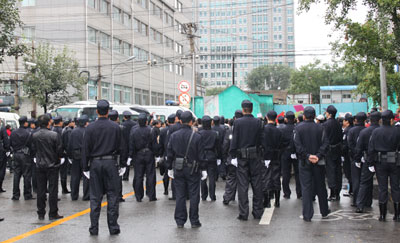A History of Anger

Heavy Security around the Japanese Embassy on September 18
While I was an English teacher at a preschool in Beijing, we took our class on a field trip to the Museum of the War of Chinese People’s Resistance Against Japanese Aggression. As the three and four-year-olds in my class held hands with their buddies while gazing up at the displays of torture equipment and photographs of Chinese civilians being murdered by Japanese soldiers, my coworker said to our students, “Look around children. This is why we all hate Japan.”
From a young age, people in China have been trained to hate Japan, and due to Japan’s previous actions in China, this indoctrination is not difficult to accomplish. The recent boat collision has added fuel to the fire of Chinese nationalist anger.
September 18 marked the 79th anniversary of the “Mukden Incident”, which Japan used to justify its invasion of China. To commemorate this day, and to protest the recent Japanese arrest of a Chinese trawler captain, Chinese citizens gathered in front of the Japanese Embassy in Beijing. The Chinese government was cautious about the gathering, upping security and removing posts on the internet about the protests, which most assumed was to avoid the violence which broke out the last time a major anti-Japanese demonstration took place in Beijing in 2005.
In a seeming shift from trying to temper rage against Japan while speaking to a group of Chinese citizens and Chinese-Americans in New York, Wen Jiabao stated that China viewed the detainment of the trawler captain as “illegal and unreasonable”. Anti-Japanese rhetoric was further stepped up on the 22 when Foreign Ministry spokesperson, Jiangyu urged Japan to release the captain and said in a written statement, “It is futile to play tricks by deceiving the world and international public opinion”
Although it may seem like the Chinese government is sending mixed signals to Japan, by keeping demonstrations at a minimum and then publicly condemning Japan’s actions just a few days later, this past Saturday, China’s leaders seemed to be a bit more worried about protestors taking the opportunity of a public gathering to express their frustrations with the Chinese government. My coworker witnessed protestors holding signs condemning government corruption; he saw one protester get beaten by a plain clothes policeman and another attempting to broadcast the demonstration live with his laptop taken away from the scene. Recent public statements seem to be trying to keep citizen anger directed at Japan.
My British friend was recently asked by a Chinese coworker if he hated all Germans. When he responded, “not at all,” his coworker was astonished. While to most Europeans, Germany’s actions in WWII are merely a historical fact, China cannot seem to forgive Japan for their former imperialism. For their part, Japan has not made forgiveness easy with their history books that downplay their WWII involvement, and their past visits of MPs to war memorials. China is also suspicious of Japan due to their close alliance with the US.
At the moment, it seems that the government has been successful at making sure the flames of China’s anger are flaring towards Japan, but who knows when the wind might change.
The views posted here belong to the commentor, and are not representative of the Economic Observer |
Interactive
Multimedia

- EEO.COM.CN The Economic Observer Online
- Bldg 7A, Xinghua Dongli, Dongcheng District
- Beijing 100013
- Phone: +86 (10) 6420 9024
- Copyright The Economic Observer Online 2001-2011
















